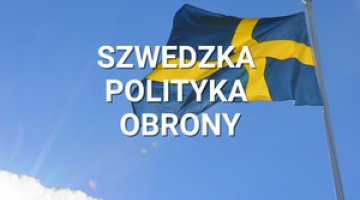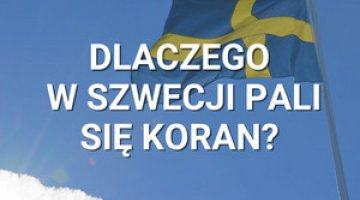Sweden’s new government: domestic changes, security consensus
On 18 October, Ulf Kristersson, the head of the Moderate Party and the new Prime Minister, presented the Statement of Government Policy in the Riksdag and announced the ministers of the new centre-right coalition (the Moderate Party, the Christian Democrats and the Liberal Party). A day earlier, the parliament had approved the speaker’s proposal to appoint Kristersson as prime minister by a margin of three votes. In the Riksdag the three-party coalition (103 seats) is supported by the Sweden Democrats (73 seats), which is described as populist and far-right. Due to opposition from smaller centre-right parties, the Sweden Democrats were not included in the coalition, but were given influence over its policy through an agreement between the four parties concluded on 14 October (Tidsöavtalen).
In the Statement, Kristersson listed the four most urgent tasks: the fight against serious crime; overcoming the recession (rising inflation and extreme energy and fuel prices) and social problems (high levels of immigration, failed integration, social exclusion paired with benefit dependency); achieving climate goals while guaranteeing reasonable electricity prices; bringing Sweden into NATO while achieving a strong position in the alliance and strengthening the Swedish Armed Forces.
All key foreign and security policy positions will be in the hands of the Moderate Party: Jessika Roswall became Minister for EU Affairs in the PM’s Office; Tobias Billström became Minister for Foreign Affairs with Johan Forssell becoming Minister for International Development Cooperation and Foreign Trade in the same ministry; Pål Jonson became Minister for Defence and Carl-Oskar Bohlin was given the new position of Minister for Civil Defence in the Ministry of Defence.
The new Swedish government was formed a few weeks after the parliamentary elections that took place on 11th September. They were won by the centre-right parties (the Sweden Democrats, the Moderate Party, the Christian Democrats, the Liberal Party), which won a total of 176 of the 349 seats in the Riksdag. The Sweden Democrats became the largest centre-right grouping with the second highest result in the election (20.54% of the votes). The outgoing Social Democrats, led by Prime Minister Magdalena Andersson, achieved the largest support in the election. They improved on their previous result, winning 30.33% of the votes, but the poor performance of the parties supporting the Social Democratic government prevented them from staying in power.
Commentary
- The centre-right coalition with the parliamentary backing of the Sweden Democrats is a precedent in Swedish politics. For the first time a populist right-wing party, with which other centre-right groupings had previously refused to cooperate, will gain influence over the Swedish government and its policies. Formally, the Sweden Democrats will not be part of the coalition, but it will have a coordination office in the PM’s Office and will control the implementation of key provisions of the coalition agreement. The Sweden Democrats’ main demands in the election campaign were stricter migration and asylum policies, to improve the fight against organised crime, making welfare state benefits only available to Swedish citizens, and lower fuel prices. Due to the dissatisfaction of some representatives of the Liberal Party with the influence of the Sweden Democrats’ on future governments’ policy areas, it is not impossible that crises may arise among the four parties that may result in changes in the composition of the coalition, renegotiation of the coalition agreement or even a centre-left takeover if individual liberal members of parliament withdraw their support for the Kristersson government.
- According to the coalition agreement the centre-right government intends to introduce reforms in six areas of domestic policy: healthcare, climate and energy, the fight against serious crime, migration, education and the economy. On energy policy, the new government would like, among other things, to develop nuclear energy – it will allocate funds for the design and construction of new nuclear power plants and the possible recommissioning of decommissioned reactors (there are currently three Swedish nuclear power plants in operation – Forsmark, Oskarshamn, Ringhals – with a total of six reactors). In migration and asylum policy, the government wants to introduce measures to reduce migration to Sweden and revise the previous strategy in this area, including exploring the possibility of withdrawing residence permits for people who no longer meet the relevant criteria, tightening the conditions for granting citizenship, and expelling people with criminal records. In the fight against organised crime, solutions are to be implemented to combat gangs more effectively, including deporting gang members who do not have Swedish citizenship, tightening penalties, and introducing an anonymous witness system.
- Foreign, security and defence issues were not addressed in the coalition agreement, but became part of Kristersson’s Statement of Government Policy. The government will pursue the previously agreed paradigm shift in security and defence policy. The completion of Sweden’s accession process to NATO (along with Finland) will be crucial. Kristersson indicated that his government will follow through on the provisions of the Swedish-Finnish-Turkish agreement of July this year, which is expected to lead to Turkey’s ratification of the two countries’ accession protocols. He also announced the fulfilment of commitments in NATO and the strengthening of the Swedish Armed Forces. Stockholm plans to spend 2% of GDP on defence per year by 2026 at the latest (in 2021 it was about 1.2%), and will invest in military capabilities and the civilian components of total defence. In order to make the military and civilian defence better integrated with crisis preparedness, a national security council will be established, a new national security strategy will be developed and the first national security policy adviser will be appointed.
- In foreign policy, the most important challenge for the new government will be Sweden’s Presidency of the Council of the European Union in the first half of 2023 (more information will be forthcoming). The general priorities listed by the new prime minister are: to ensure the security of EU citizens and to jointly support Ukraine. Moreover he mentioned energy supply, climate transition, strengthening the EU’s competitiveness through a digital transformation and technology policy in cooperation with the US. The centre-right government will withdraw from the feminist foreign policy pursued by the Social Democrats and will want to reform development assistance policy by reducing the resources allocated to it and by changing priorities. Development support to Ukraine will be increased.
- On the issues of arms supplies to Kyiv, Kristersson announced the transfer of more advanced weapons systems. This may be decided soon as by 25 October the Swedish Armed Forces and the Swedish Defence Materiel Administration (FMV) are to present the proposals for short-term and long-term military support to Ukraine which were commissioned by the previous Social Democratic government. In August, Sweden’s foreign minister suggested that the possibilities for deliveries of Archer artillery systems (24 used by the Swedish army, 24 stored) and RBS 70 man-portable anti-defence systems would be explored. According to the Kiel Institute for the World Economy from October this year, Sweden’s military support to Ukraine has so far amounted to around €274 million. After the start of the Russian invasion, the Social Democratic government decided to abandon its previous policy of not supplying weapons to conflict areas. As a result, from February to September this year, Sweden supplied Ukraine with seven tranches of materiel, including 15,000 AT4 anti-tank grenade launchers, several thousand helmets and individual soldier equipment, the Robot 17 anti-ship system based on Hellfire missiles, AG 90 sniper rifles (Barrett M82), artillery munition and light weapons. Part of the Swedish arms deliveries were classified. PM Andersson’s government also sent 120 Swedish military instructors to the UK to provide training to the Ukrainian soldiers, and donated €90 million to the Ukrainian Armed Forces Support Fund and €10 million to the NATO Fund, which equips Ukraine for defence against ABC weapons. In addition, Stockholm is providing humanitarian and financial assistance to Kyiv.
APPENDIX
Chart 1. Results of the Swedish general election of 11 September 2022

Source: ‘Val till riksdagen - Slutligt valresultat - Riket’, Valmyndigheten, resultat.val.se.
Chart 2. Distribution of seats in the Riksdag after the general election on 11 September 2022

Source: ‘Den nya riksdagen efter valet’, Sveriges Riksdag, 18.09.2022, riksdagen.se.





